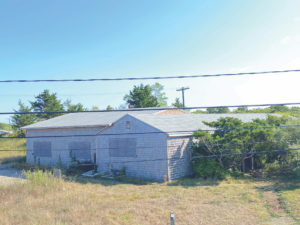TRURO — Town meeting may feel more like recess this year, as voters gather outdoors at the Truro Central School ballfield at noon on Saturday, Sept. 26.
Even the warrant has been child-sized, now that the planning board has withdrawn 11 articles that would have gone before voters in April had the coronavirus not delayed spring town meetings and pushed them outdoors. The planning board held back on articles it had worked hard on in order “to minimize the amount of time we’re exposed to each other and the elements,” said Town Manager Rae Ann Palmer.
The select board also agreed on Tuesday to withdraw from the warrant an article on the hiring of four new firefighter-paramedics, which would have increased the size of the fire dept. by 50 percent, from 8 to 12 members. This would have cost taxpayers $351,904, adding $75.89 to the first-year tax bill on a home valued at $500,000, said Fire Chief Timothy Collins.
The same request, which involved a Proposition 2½ override, failed to get a majority at the town election in the spring by a vote of 209 to 257. But officials wanted it to go before voters again. If the proposal had been approved at town meeting, they would have scheduled yet another town election for the next hurdle.
Palmer said more paramedics are important, due to the domino effect that will result if Provincetown Fire Chief Mike Trovato is successful in parting ways with the Lower Cape Ambulance Association (LCA). That nonprofit provides ambulance services to both Provincetown and Truro, and the combined support of both towns is necessary to keep LCA afloat. If Provincetown withdraws, Truro would need to take on much more of the cost of the ambulance service.
Trovato, who has refused for months to talk about his reasons for wishing to break away from LCA after 83 years, on Monday told the Independent he has “given up on trying to create a Provincetown emergency medical service” and will stick with LCA. Trovato said he still thinks his idea is the right move, but he realizes he does not have support from town hall.
After hearing this news, the Truro Select Board Tuesday agreed to remove the firefighter article from the warrant.
“I think it would be best to not put it on the override and wait until the dust settles in Provincetown,” said board member Jan Worthington. “We just need to be clear with the public, because it’s been such a screwed-up process.”
Chair Robert Weinstein agreed.
“I think it’s important for people to understand why we are removing this and the difficulties we have in dealing with — hopefully, it’s not impolite to say — erratic behavior coming from Provincetown,” Weinstein said.
Articles that will likely still generate interest include a petition to make the planning board an appointed rather than elected body.
Only six of 15 Cape Cod towns have elected planning boards, said Robert Panessiti, chair of the Truro Charter Review Committee. Many argue that planning board positions are rarely contested, so whoever signs up, even as a write-in, gets on the board without any real oversight, which the select board would have if it appointed the members. But the charter committee, which was reviewing this change, did not make a recommendation on this article. And the select board voted 2 to 3 against it, with Weinstein and Kristen Reed in favor.

Among the community preservation articles is a proposed $168,000 grant to the Payomet Performing Arts Center to help the nonprofit enter into a lease with the Cape Cod National Seashore to renovate the old clubhouse at the abandoned North Truro Air Force Base and use it as a performance space.
If successful, it would be the first time since the Air Force abandoned the base that anyone had been able to renovate and lease one of the existing buildings, said Kevin Rice, artistic director of Payomet.
Payomet has a tent there, and the Truro Center for the Arts at Castle Hill built a kiln on the base. But there are dozens of abandoned buildings that are slowly falling apart.
The clubhouse is a 3,000-square-foot building used from 1951 to 1984 by enlisted officers and the community as a bar and gathering spot.
“It was really the hub of a lot of socializing, and a lot of marriages resulted from it,” Rice said. “We are working on an agreement with the park service — a philanthropic partnership.”



